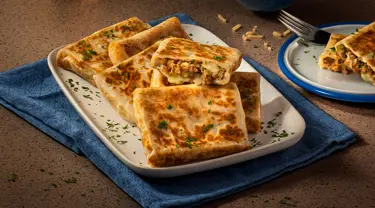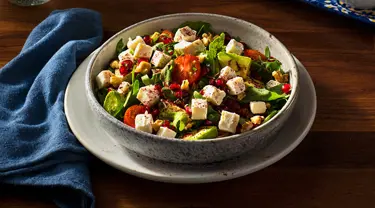

Stressed about making your Ramadan recipe list?
We’ve got you!
Discover Puck’s complete guide to Ramadan, with easy recipes for apps, main dishes, salads, soups and desserts. We also include simple tips for adding your own special touch, so you can focus on creating a joyous Ramadan experience for your whole family. Because you make Ramadan special.

During this Ramadan, a season of generosity and togetherness, we unite to assist Lebanese families in need. Meet the remarkable mothers who created these dishes and savor their genuine recipes at chosen restaurants in Saudi Arabia and the UAE, available via delivery apps or by making them yourself at home. 50% of total proceeds will go toward helping affected Lebanese families rebuild their lives.





In 2025, Ramadan is expected to start on either the 1st of March or 2nd of March. The first day of the Holy Month of Ramadan is determined by the Islamic lunar calendar, which begins with the sighting of the crescent moon. On the evening of Friday February 28th, Saudi Arabia and other countries with a Muslim-majority population will rely on the testimonies of the moon sighters who will be looking for the Ramadan crescent moon. If seen, the holy month will begin on Saturday, March 1st. If not, then Ramadan will begin on Sunday, March 2nd.
Ramadan occurs in the ninth month of the Islamic calendar. Because this calendar is tied to the phases of the moon, the Holy Month changes yearly, moving back about 10 to 11 days. The day Ramadan starts depends on both the lunar calendar and the actual sighting of the crescent moon in a given country, which means that different countries can have varying starting days, but these usually differ only by one day.
No matter when it starts, Ramadan becomes a special time full of family gatherings, iftar feasts, and hearty Suhoor meals. These meals bring family members together to make lasting mealtime memories, and moms are often the ones coming up with their own creative ways to lovingly prepare and serve delicious Ramadan dishes in their own special ways.
Iftar is the meal you have at sunset to break a day-long fast, and it becomes a nightly celebration with family and friends. From the first bite of Iftar to the last sweet treat, moms are the ones dreaming up the feast that brings everyone together to take part in mealtime joy.
There are different traditions and customs for breaking a fast. Some families break their fast by eating three dates, some start with water, while others begin with a bowl of soup to ease into the meal slowly before enjoying a festive lineup of mouthwatering, mom-crafted dishes. This meal is a vibrant celebration of flavors. It can start with traditional appetizers such as Sambosa and Kebbeh (every mother will have her own special way of making these classics).
Appetizers are often followed by rich, savory, and lovingly made dishes such as Muttabaq, Ouzi, and Fatteh. After Iftar, sweet desserts such as Kunafa, Basbousa, and Qatayef, are often enjoyed, each infused with mom's special touch that adds warmth and affection to every bite. Moms’ personal touch transforms these meals into unforgettable Ramadan moments, making each dish uniquely special.
Before sunrise, you prepare the body for a new day of Ramadan fasting by eating Suhoor, and each mom has her own strategies for creating sustaining morning meals for her family.
Often, Suhoor consists of quick, easy, light dishes but can vary widely across cultures and households, showcasing the diverse culinary traditions of this Holy Month. While some families prefer simple, light dishes like eggs, labneh, and shakshuka, others indulge in spreads that might include dates, whole grains, fruits, and nuts, ensuring a slow release of energy throughout the day. Keeping your family hydrated is also a key focus during Suhoor. Ensure your family drinks plenty of liquids, such as water, milk, or herbal teas to minimize their thirst during the fasting hours.
You can find some Suhoor recipes and strategies for getting the morning meal ready with our 7 quick and easy Suhoor ideas for Ramadan. However you decide to prepare for the fast ahead, know that moms are the ones who make this pre-dawn meal special in their own unique ways.